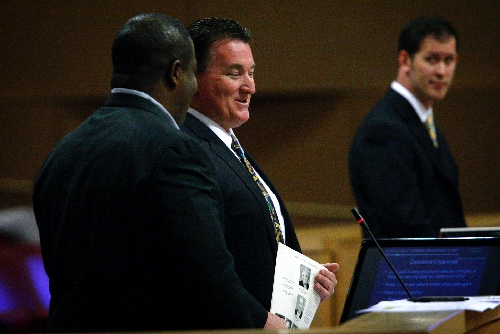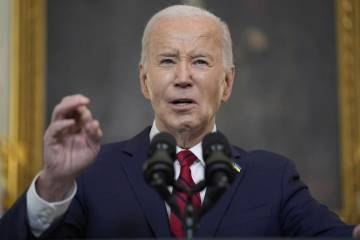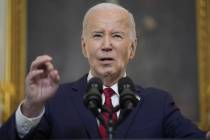Las Vegas council approves public housing project
Two former Las Vegas councilmen with past brushes with the state Ethics Commission were back in City Hall on Wednesday, this time closing a deal for an affordable housing project with $11 million in public subsidies.
Michael McDonald and Frank Hawkins spent more than an hour in front of the City Council seeking to explain their proposed three-phase, 196-unit project marketed toward residents 55 and older and unravel criticism from skeptical city staffers who recommended the council deny the project.
In the end, the council voted 5-1 in favor of four items needed to advance the project, despite objections from Bill Arent, the city's director of economic and urban development, and outside critics questioning the need for newly constructed affordable housing in a community that is burdened by foreclosure blight and a housing surplus.
"I think the City Council are the only people in the world who can make the argument there is a shortage of housing in Las Vegas," said Geoffrey Lawrence, deputy policy director at the conservative think tank Nevada Policy Research Institute, who was not at the meeting. "It sounds primarily like a project intended to benefit a developer more than an elderly population."
But McDonald, the developer of the project, and Hawkins, acting as a consultant, stand by the proposal that has been in the works for years and defended it as vital to reviving a blighted neighborhood near Decatur Boulevard and Vegas Drive.
In 2001 the Ethics Commission found that McDonald violated rules by urging the city to enter a business deal that would have benefited his boss.
In 1995 Hawkins was found to have failed to disclose a loan from a business with issues before the council and for benefiting from a golf tournament that had participants with business before the city.
But the best way to judge their current project on city land, they said, was to watch for them to deliver results on the timetable set forth in the development agreement.
"A year from now the public can see the public benefit," said Hawkins, who since leaving the City Council after being defeated by McDonald has developed several affordable housing projects.
They cited state and private sector research showing a need for hundreds of units of quality housing for the rapidly increasing population of baby boomers and senior citizens, despite the overall state of the housing market.
They also objected to a staff report that drove much of criticism of the proposal.
According to the report, the city subsidies penciled out to $97,975 per affordable housing unit, an amount that's two or three times the per unit subsidies at other projects, based on the $3.9 million in redevelopment money and federal funds covered by the council vote.
It's also much higher than the median value of $72,000 for existing homes near the proposed project.
McDonald and Hawkins, however, said the cost per unit included in the staff report was misleading. They said phase one would include 60 affordable housing units, which would equate to $65,000 per unit.
And if the subsidy were divided by the number of units in all three proposed phases it would be less than $20,000.
Although once the tax credits that require state approval are factored in, the per unit subsidy would equate to $183,000 spread over 60 units, or $56,000 spread over 196 units.
State law allows for affordable housing subsidies of up to $204,000 per unit.
Arent said he limited the subsidy calculation to 40 units because that is the number the project categorized as "low income" with a projected rental rate of $494, or 40 percent of the area median income. The remaining 20 units in phase one are categorized as "market rate," with projected rent of $750, although McDonald and Hawkins said the entire project would be affordable housing.
Councilman Ricki Barlow, a strong backer of the project, compared it to other projects subsidized by redevelopment money, such as the recently opened Smith Center for the Performing Arts and the new City Hall at 495 S. Main St.
"It is time now to start spending some money in the neighborhoods," Barlow said. "We can't forget about our residents, and I'm not going to sit there and allow that to happen on my watch. If I have to spend a little bit more money to bring up a blighted site than so be it."
Also in the report was criticism that McDonald "does not have any experience in developing affordable housing" and that an earlier agreement between McDonald and the city to develop the land was "terminated for nonperformance" by the developer.
The criticism, along with another part of the staff report that said a portion of the land would be better used as commercial property, weighed on Councilman Bob Coffin, the only vote against the proposal.
"The important thing here, your honor, is that we don't really have an idea as to how much this project ought to cost," Coffin said to Mayor Carolyn Goodman, adding that there should be an open bid process for the project. "We don't know if others would bid or not. We don't know because we didn't ask to my knowledge."
Contact reporter Benjamin Spillman at bspillman@reviewjournal.com.




























